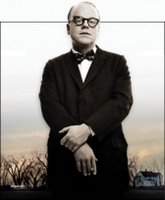During my last semester at Iowa, I took a Nonfiction Writing course that just wasn't scratching my creative itch. Despite that frustration, I enjoyed the class because of the material that was assigned. One of the books we had to study was Truman Capote's In Cold Blood, something I'd always wanted to read.
The term "creative nonfiction" was thrown around a lot in those courses. For anyone who wondered what exactly that entailed, Capote's book provided a perfect example. It wasn't just a report of the Clutter family murders that took place in 1959. Capote told a story, creating some sequences to pull everything together. He got into the heads of his subjects, giving them distinct voices on the page. He painted scenery with his words. You already knew this, but I'll say it anyway: it's an amazing piece of work.
So when I found out a movie was being made (two, actually) about the writing of In Cold Blood while doing research on Capote, I was excited. Philip Seymour Hoffman's playing him? I was thrilled. To me, one of the more intriguing things about Capote is that it tells a story about a book being written, without being boring. And that's probably because of the title character. Capote was such a personality, which the script and Hoffman detail perfectly. He's flamboyant. And arrogant. The man was a literary rock star, something I'm not sure could happen in our current culture. Of course, that means he's narcissitic. But he's also amazingly perceptive and empathetic (two traits which surely helped his writing). And ultimately, he uses those skills to get what he wants.
To me, one of the more intriguing things about Capote is that it tells a story about a book being written, without being boring. And that's probably because of the title character. Capote was such a personality, which the script and Hoffman detail perfectly. He's flamboyant. And arrogant. The man was a literary rock star, something I'm not sure could happen in our current culture. Of course, that means he's narcissitic. But he's also amazingly perceptive and empathetic (two traits which surely helped his writing). And ultimately, he uses those skills to get what he wants.
How manipulative was Capote? Well, it probably depends how you interpret the information the movie gives you. But the portrayal of Capote isn't a soft one. Toward the end of the story, he's outright hoping for the execution of the killers - Dick Hickock and Perry Smith - because that's the ending he needs for his book. But he also knows what kind of person that makes him. Dealing with that is probably the central conflict of the film, one made more complex due to the relationship Capote has formed with Smith. Yet the story ends with enough questions to compel you (or me, anyway) want to devour any Capote biography available.
And Hoffman isn't the only actor who shines, either. Catherine Keener's Harper Lee (of To Kill a Mockingbird fame) is essentially Capote's conscience, giving him the kind of friend we all need sometimes - someone who's willing to call you out when you're being an asshole. And her own literary success that develops during the story provides a further opportunity to show Capote's self-centeredness. But Clifton Collins, Jr.'s portrayal of Perry Smith might be the most intriguing of the movie. You can see how Capote became so taken with him. How can such a seemingly gentle soul also be a heartless killer? It's an intoxicating question. Yet maybe Capote isn't the only one being manipulative. Collins's performance shows all of those sides, and sometimes within one scene.
It doesn't matter if you read In Cold Blood or not. I actually think it might be better if you didn't. Then, if you're interested, you can go read the book with the backstory in your mind and form your own opinions. But if you did read the book, this movie is something of a behind-the-scenes DVD extra. How often do you get to know the person who wrote the book, and the people behind the characters in the story?
Capote will stay with you as you leave the theater. I think you'll want to talk about it, and learn more about the story. That resonance, that kind of substance, makes this such a good movie.
Wednesday, November 16, 2005
Movie Week -- Capote
Posted by
Ian C.
at
11:00 AM
![]()
Labels: movies, Philip Seymour Hoffman
Subscribe to:













